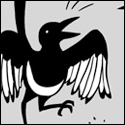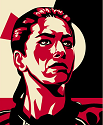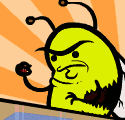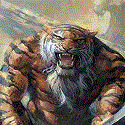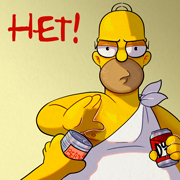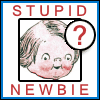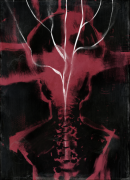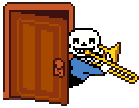|
Hieronymous Alloy posted:It was revolutionary for the time and LeGuin is one of the best prose stylists in the field. It also kinda depends on what sortof SF reader you are. There's enough male-fantasy SF still being written that if that's all you've read, LHoD is still going to throw you for a loop even today. I like LeGuin and have fond memories of the EarthSea series, which is more straightforward fantasy. LHOD was more along the line introducing an interesting concept and elaborating on that, than regular scifi. Scifi for me is more along the lines of how different technologies (biological, technical or psychological) affect the world. The Envoy in LHOD is basically a was to introduce an outside view of a one-gender society and has few really advanced technological concepts important to the story.
|
|
|
|

|
| # ? May 10, 2024 00:30 |
|
I've never really understood Gaiman's success and popularity, personally. The only book of his I read was American Gods and I hated myself for wasting time on it. The concept was kind of interesting but his writing is just painfully simplistic. Maybe I'm just spoiled by Miéville and Murakami and the like, because reading Gaiman felt like reading a children's book.
|
|
|
|
For scifi books for that class and ones that blow gender and race wide open I recommend Octavia Butler's Kindred from 1979. It's scifi but generally gets buried in "African American Interests" instead of getting shelved with scifi. As a result (not to go all hipster here) most of the scifi audience hasn't heard if it. But it is a heavy book. Misogyny, race, class, causality... Whole lot of big themes get explored there.
|
|
|
Noctone posted:I've never really understood Gaiman's success and popularity, personally. The only book of his I read was American Gods and I hated myself for wasting time on it. The concept was kind of interesting but his writing is just painfully simplistic. Maybe I'm just spoiled by Miéville and Murakami and the like, because reading Gaiman felt like reading a children's book. Gaiman's reputation is built on Sandman, Neverwhere, and Stardust, imho. Stardust is impressive because it's a good book and based on a sortof Pre-Tolkien fantasy style that nobody else had bothered to even try to write for the past few decades. Neverwhere basically started the whole "alternate magical London" craze that a hundred authors have since imitated. Sandman is legitimately amazing and beautiful and everything a work of fantasy should dream of being BUT you're going to need to read all ten volumes at about $20 a volume to get the full effect. Personally I feel like he's been coasting since then, apart from a couple of very solid children's books (Coraline and Graveyard Book). I felt like the basic concept in American Gods had been executed previously by better writers.
|
|
|
|
|
Cardiac posted:I like LeGuin and have fond memories of the EarthSea series, which is more straightforward fantasy. Part of the value of LHOD is that it helped people realize that the definition of SF you advance here was incomplete and blinkered. e: and yes Kindred is also brilliant
|
|
|
|
Hieronymous Alloy posted:Personally I feel like he's been coasting since then, apart from a couple of very solid children's books (Coraline and Graveyard Book). I felt like the basic concept in American Gods had been executed previously by better writers. [edit]Although some of his short stories can be okay. A Study in Emerald was pretty decent, if a bit trying too hard. Cardiovorax fucked around with this message at 22:36 on Mar 8, 2014 |
|
|
|
Finished reading The Red Knight last night. I wanted to like it, I really did. The author has great potential and I might even give the sequel a chance but it was not a good book. In the first 50 pages or so the titular character, whose real name we don't learn until half way in, because ~mysterious, dark past~ filled with mommy and daddy issues, hating God, and destiny, uses his magic powers to sneak into a dormitory of nuns and force himself upon the cute nun that was checking him out earlier. When he's done with their long kiss he breaks off and backs away so she "won't think he is a rapist" (that's almost verbatim from the book). Not only is he a powerful magic user, he is also a military genius, an excellent fighter, handsome, and a talented musician all at the age of 20. The author knows his history and medieval warfighting, which makes for well written fights, but more often detracts from the story. Its great that you know the correct name of every bit of gear a knight would put on, but I don't need to hear about it before every fight. And maybe describe what all those pieces really are because I am not a medieval expert. Also people in this fantasy world speak French and worship a being they call "God" who apparently sent his son "Jesu" down to earth to die for our sins. I believe, based on the acknowledgements, that the world and possibly the plot, are based on a RPG campaign of some sort that the author played. I mentioned that the fights are well written but there is often not any tension due to the fact that most of the enemies are not serious threats, except for wyverns, trolls and daemons (who don't fight much and are also described as both "angelic" and "alien" looking). The creatures and free/savage men from the Wild (very original) are frequently described as unable to overcome humanity's heavy armor due to their poor weapons and lack of skill. The only way they can win is through sheer force of numbers. They might as well be using nerf weapons for all the arrows and clubs and daggers that bounce off plate mail. The Main Bad Guy is like something out of a saturday morning cartoon; his schemes are defeated due to his sheer ineptitude and bumbling stupidity of his allies. The amount of POV characters in this book is ridiculous and they are still being introduced up to the half way point. Most of them are flat, uninteresting, and completely forgettable. The Queen is kind hearted and beautiful. The old lady is old, folksy, and reserved (because she is old, you see). The ex-slave never wants to be a slave again. The squire is young and naive but eager. That is as deep as the characterization goes. There are a few I would like to read and learn more about; Sir Gawin, the Lachlans, Master Random and Sauce. Certainly not the Red Knight, Mags, or Peter. When the book should end, it doesn't, because its dragged out a few more chapters so the sequel can be set up. The book is about 600 pages and desperately in need of some editing because almost half that is worthless. I will try out a sample of the sequel before buying, but I am willing to give this author another chance because I do think he has potential.
|
|
|
|
Cardiovorax posted:Good Omens was very good, but I don't know how much he contributed to that, really. I can't say I liked much of anything else of his work. I loved Good Omens and Sandman series. Other than that, I'm on the fence. American Gods was ... meh for me. So I take his writing with a grain of salt and look to see who the co-author is.
|
|
|
|
The Ocean at the End of the Lane was maybe not his best, but worth reading, I thought.
|
|
|
GrannyW posted:I loved Good Omens and Sandman series. Other than that, I'm on the fence. American Gods was ... meh for me. So I take his writing with a grain of salt and look to see who the co-author is. Anasazi Boys is a much better story than American Gods, but shares the same world and conceits.
|
|
|
|
|
ConfusedUs posted:Anasazi Boys is a much better story than American Gods, but shares the same world and conceits. Thanks! I'll add it to my list 
|
|
|
|
I think you mean Anansi boys? Which is much better, because Anansi is a way better mythological rear end in a top hat than the Anasazi are.
|
|
|
|
Having already been aware of urban fantasy, and introduced to the magical London concept by Kraken, Neverwhere didn't impress me. There were some good segments, but the whole was entirely too twee and somehow 'narrow' to provoke the sense of wonder and magic that (say) Kraken did. Gaiman's work other than Sandman hasn't really impressed me. I think fantasy has moved on from his style in general and he'll spend some time with a dimmed star as the reaction works itself out.
|
|
|
|
FastestGunAlive posted:Finished reading The Red Knight last night. I wanted to like it, I really did. The author has great potential and I might even give the sequel a chance but it was not a good book. Don't read the sequel then, I really liked the first book but the second soured me a bit. Mostly because I somehow assumed that it was set on some alternate europe while reading the first book, which was disproven in the second (and the map). In hindsight this should have been obvious, I attribute it to mental gymnastics to explain the french and the religion (and the place names being similar to real ones in a way that could have made sense). Since it is not set in an alternate earth, I agree that the many references to things from real history and the French grate a lot. I did enjoy the first book regardless, because although there are too many point of view characters and hence too little characterisation for many, the overall plot is still very enjoyable because of good use of mystery, strategies and very well written fights. The characterization of the cast greatly improves in the second book though, because very few new members are used and everybody from the first book get's more backstory/uniqueness. My problem with the second book (beyond the language and Earth parallellism stuff) is that it starts a lot of different stories/plots and resolves almost none of them, so my advice for now is to wait and see if the third book resolves some of the plot lines before starting the second book. To be honest, I'll probably read the third book as well anyway, simply because the backstory is honestly still plenty interesting and because I just don't know many better books in that specific genre (military fantasy).
|
|
|
|
Cardiac posted:Furthermore, the whole AI thing plus biotechnology has made gender kind of irrelevant as an interesting topic in scifi (except of course the backwardness of some authors).
|
|
|
|
Technology making gender less significant is in itself an interesting avenue for SF exploration of gender.
|
|
|
Cardiovorax posted:I think you mean Anansi boys? Which is much better, because Anansi is a way better mythological rear end in a top hat than the Anasazi are. Oops, yeah. The proper title is Anansi Boys. I read The Haunted Mesa by Louis L'Amour recently and it focuses pretty heavily on the Anasazi and their lore, so that's why I got the names mixed up. The Haunted Mesa is a really interesting book in a number of ways. It's something of a proto-Urban Fantasy novel, but it's a Western. It shares some noir influences, there's a big mystery, and it's the Real World except there's weird poo poo hiding behind the scenes. Except it was written years before contemporary Urban Fantasy really existed. I can only think of two other settings that existed at that times: Anne Rice's vampires and Highlander (there can be only one). And neither of those are really contemporary Urban Fantasy, since both are rooted in history to one degree or another.
|
|
|
|
|
Cardiac posted:Furthermore, the whole AI thing plus biotechnology has made gender kind of irrelevant as an interesting topic in scifi (except of course the backwardness of some authors). Go track down and read "Congenital Agenesis of Gender Ideation" by Raphael Carter.
|
|
|
|
Walh Hara posted:Don't read the sequel then, I really liked the first book but the second soured me a bit. Mostly because I somehow assumed that it was set on some alternate europe while reading the first book, which was disproven in the second (and the map). In hindsight this should have been obvious, I attribute it to mental gymnastics to explain the french and the religion (and the place names being similar to real ones in a way that could have made sense). Since it is not set in an alternate earth, I agree that the many references to things from real history and the French grate a lot. That's too bad. Like you, I picked up this book in hopes of reading some military fantasy. The only others I've read are the Black Company and arguably Malazan (I've only read the first 2 books). I wish Robert Jordan would have spun off with the Band of the Red Hand instead of 15 books of battle of the sexes because those sections were well written and he was a veteran himself. This book seemed to veer off toward standard fantasy toward the end with the whole, lets visit the dragon, get magic weapons, and learn about the great evil that threatens this world or whatever. Guess I'll just cut my losses. Any recommendations for East Asian themed fantasy? I've read Master Li and Number Ten Ox, enjoyed it, but looking for more fantasy and less historical fantasy/fiction.
|
|
|
|
Hieronymous Alloy posted:Gaiman's reputation is built on Sandman, Neverwhere, and Stardust, imho. Stardust is impressive because it's a good book and based on a sortof Pre-Tolkien fantasy style that nobody else had bothered to even try to write for the past few decades. Neverwhere basically started the whole "alternate magical London" craze that a hundred authors have since imitated. Sandman is legitimately amazing and beautiful and everything a work of fantasy should dream of being BUT you're going to need to read all ten volumes at about $20 a volume to get the full effect. Coraline was a good book, but I enjoyed it much more when it was published as The Thief of Always by Clive Barker.
|
|
|
|
mystes posted:Let me get this straight: the existence of imaginary technology making gender less significant in the fictional worlds of some science fiction books means that science fiction books are not allowed to deal with gender except to dismiss it as automatically a non-issue? That sentence makes my head hurt. Also, that is not what I meant. I'm just pointing out that in a universe with AIs and advanced biotech, gender is much more of a non-issue than it would be in a future closer to our current time. The Culture series is an example. If technology takes biology out of the picture, gender is much less relevant as a topic. If people want to read SF that focuses on gender issues they are free to do that, it is just not what I am interested in. Cardiovorax posted:I think you mean Anansi boys? Which is much better, because Anansi is a way better mythological rear end in a top hat than the Anasazi are. Anansi was the best part of American Gods. Anasazi, the book was just boring.
|
|
|
|
Cardiac posted:That sentence makes my head hurt. You really don't understand that by making gender much less relevant as a topic (in universe) as a result of feature X of universe, the author is actually making a potentially interesting statement about what drives gender issues in our world, right? I mean, if removing resource constraints does it, then aren't you implying that gender roles are rooted in resource issues? If allowing people to switch their own sex does it, you're asserting that it's a lack of experience with the other gender. (Completely ignoring what that situation says about gender identity and transgender individuals.). If cloning enables a single-sex society, what traditional gender roles are replicated in that society? Not to mention that, just to take an example of yours, Banks is well aware of gender issues and how they fit into the culture - see his discussion of the oddity of the character who chose to remain one sex their entire life, or the Cultural reaction to the gender issues in the Game society. Just because gender is less of an issue in the fiction doesn't mean it isn't saying something about gender. It may not be slapping you in the face with it, but it's there.
|
|
|
|
Cardiac posted:That sentence makes my head hurt. This is itself a considered, calculated statement about gender - but it's not at all an inevitable one, and it shows a lack of thought about the relationship between technology and gender that's endemic among SF/F readers and writers. Let's take the Banks example, since you tried to use it as an example of a series where technology has marginalized gender. In Excession alone you have some very powerful stories about gender and technology. First, an examination of the incredibly painful traumas available to a dysfunctional couple that can change sex, and a study of the scars those traumas leave. Genar-Hofoen is now 'stuck' as a man, in that he has a powerful gender preference and a strong aversion to becoming a woman again because of the experiences he has. He even goes so far as to join the Affront at the end of the book, which is an incredibly bleak gender statement, because - - the Affront takes your assertion that gender is a non-issue in the Culture series and tears it apart with screeching glee. They are an entire species that used their mastery of advanced biotech to biologically alter their females into non-sentient slaves who experience immense pain during sex. Ah, the universally liberating power of technology, rendering gender irrelevant! Another recent, relevant title is last year's smash hit Ancillary Justice, which dissects another mistaken assumption on your part - that changes in biology necessitate an erasure of gender as a relevant social construct, and that settings with advanced technology can't say anything about gender in our world today. The Radch gender system exists in spite of biology, shrugging it off as more or less irrelevant. This is in itself a powerful comment. There is a ton of complexity to gender, how it's learned, how it affects people and shapes decision. Gender systems can be subtle and minimal, even wholly absent - or they can be toploaded, prescriptive, and obvious. But I'd go so far as to say that one of the core tasks of writing a secondary world (or writing historical and future settings in our world) must be thinking about the gender system and setting it out to the reader - since you are going to do it anyway, by implication, and as much of a story as possible should be done by deliberate choice.
|
|
|
|
FastestGunAlive posted:Finished reading The Red Knight last night. I wanted to like it, I really did. The author has great potential and I might even give the sequel a chance but it was not a good book. I've read through almost all of the book (I can't finish it) but the Red Knight's relationship with Amicia is downright creepy. There's this infatuation conveyed despite the characters having little interaction and that Amicia is a one-dimensional target for lust. Even though she's of such great importance to the protagonist the author has chosen fit to never write in her perspective, which is odd given that Amicia is held in such high regard and has disproportional healing powers. It's all for the best though, the only two female characters he wrote from their perspectives were the Queen and Mag, Mag was an old lady who was rape-bait whose only talents were knitting and not reporting traitors, I understand the author desperately wanted to telegraph that the priest was the traitor to Thorn, but doing so in that way makes Mag an unsympathetic character since she's now viewed as being serenely stupid. I don't care if the captain's wearing her knitted underwear or whatever in the final battle, she's already been poisoned by being written as a blithering idiot to advance an obvious plot), and the Queen was an asexual entity whose only interaction with the outside world was to get ogled at by deeply embarrassed men. I haven't read much fantasy, is it normal that magic is a renewable resource recharged by sunlight? Or dredged up from a special well? This is all very silly. Is the author capable of writing realistic characters?
|
|
|
|
homercles posted:I don't think I have anything spoilery written here, but if you want to read The Red Knight then probably avoid this post. Yeah, the relationship with Amicia is very badly written (especially the first scene which is absolutely awful), although slightly redeemed because Amicia is still more than just a love interest and follows her own objectives. You're also a bit unfair to Mag because everybody was insanely stupid for not seeing that the priest is the traitor (actually, I think they knew he was but didn't realise he could do anything) and Mag didn't own the company anything and to the Queen. Almost all of the women in the (first) book are portrayed as independent since they follow their own objectives and decide for themselves what they'll do (regardless what men around them say/want), which is a refreshing change from most books in the genre. The abess and Sauce in particular. I don't get the comment on the magic. There is no one standard way to write magic, a writer can do whatever he wants and at least this is pretty consistent.
|
|
|
|
homercles posted:I haven't read much fantasy, is it normal that magic is a renewable resource recharged by sunlight? Or dredged up from a special well? This is all very silly. Is the author capable of writing realistic characters? A lot of (often bad) fantasy writers have a hard-on for coming up with ~magic systems~ that offer unusual mechanisms for accruing and using power. I think these usually come off as a bit onanistic and pointless, but you occasionally get a story where the mechanisms of magic are actually important to the theme and emotion rather than the puzzle-box plot. Many of the best (The Objectively Best But as Walh Hara points out, there's really no 'normal'. It's a space open to the author's creativity.
|
|
|
FastestGunAlive posted:Any recommendations for East Asian themed fantasy? I've read Master Li and Number Ten Ox, enjoyed it, but looking for more fantasy and less historical fantasy/fiction. The Long Price Quartet by Daniel Abraham might hit that sweet spot.
|
|
|
|
|
Cardiovorax posted:Good Omens was very good, but I don't know how much he contributed to that, really. I can't say I liked much of anything else of his work. If I'm remembering an interview correctly, Pratchett did most of the stuff involving Adam, Gaiman did most of the Crowley bits, and everything else was sort of hammered-out together. A great book, especially considering that most SF collaborations are pretty awful.
|
|
|
|
homercles posted:Mag was an old lady who was rape-bait whose only talents were knitting and not reporting traitors, I understand the author desperately wanted to telegraph that the priest was the traitor to Thorn, but doing so in that way makes Mag an unsympathetic character since she's now viewed as being serenely stupid. I don't care if the captain's wearing her knitted underwear or whatever in the final battle, she's already been poisoned by being written as a blithering idiot to advance an obvious plot) I found the fact that a couple of the soldiers wanted to rape Mags really weird, (besides the obvious fact that rape is disgusting) because she was an old lady. Maybe I was imagining her as being in her 60s when she was actually in her 40s or something but I was still confused as to why they wanted to rape an old lady. Walh Hara posted:Almost all of the women in the (first) book are portrayed as independent since they follow their own objectives and decide for themselves what they'll do (regardless what men around them say/want), which is a refreshing change from most books in the genre. The abess and Sauce in particular. I think all the women were sexualized in one way or another. The Queen is insanely beautiful and is lusted after by every single man, and we get a number of descriptions of how good she looks naked. Sauce was a prostitute at one point in her life. Amica mentions how she is not pure (it was early in so I can't recall if she was raped/a prostitute/or just had taken several lovers before becoming a nun). Mags feels guilty for all the times she got it on with her neighbor after her husband's death. Even the Abbess was the lover of both the old King and Thorn before he became evil. Then there are the Lanthorn girls, beautiful peasants who are nothing more than sex objects. Maybe I'm just a huge prude or something but I didn't feel any of the characters were favorable toward women. shirunei posted:The Long Price Quartet by Daniel Abraham might hit that sweet spot. I will check this out.
|
|
|
|
FastestGunAlive posted:I found the fact that a couple of the soldiers wanted to rape Mags really weird, (besides the obvious fact that rape is disgusting) because she was an old lady. Maybe I was imagining her as being in her 60s when she was actually in her 40s or something but I was still confused as to why they wanted to rape an old lady. This is getting into pathological territory, but  isn't so much an act of physical desire as it is an exercise of power. Especially in wartime, acts of sexual violence emerge from a lot of factors other than 'gotta gently caress'. This is part of why the modern campaign to recognize that dressing sexy or acting 'promiscuously' does not invite rape is so important - it helps people learn that rape is not an act of desire triggered by some mythical sex meter overflowing all self-control. isn't so much an act of physical desire as it is an exercise of power. Especially in wartime, acts of sexual violence emerge from a lot of factors other than 'gotta gently caress'. This is part of why the modern campaign to recognize that dressing sexy or acting 'promiscuously' does not invite rape is so important - it helps people learn that rape is not an act of desire triggered by some mythical sex meter overflowing all self-control.But let's not have a derail on this topic, they are the worst derails.
|
|
|
|
homercles posted:I haven't read much fantasy, is it normal that magic is a renewable resource recharged by sunlight? Or dredged up from a special well? This is all very silly. Is the author capable of writing realistic characters? I wouldn't say it's normal, but I also wouldn't say it's abnormal. Different books have different magic systems which obey different rules, and what matters is how the author uses them. Either of those two systems could be potentially interesting if handled properly by the right author, but they can also both be awful when handled improperly by the wrong one.
|
|
|
|
FastestGunAlive posted:I think all the women were sexualized in one way or another. The Queen is insanely beautiful and is lusted after by every single man, and we get a number of descriptions of how good she looks naked. Sauce was a prostitute at one point in her life. Amica mentions how she is not pure (it was early in so I can't recall if she was raped/a prostitute/or just had taken several lovers before becoming a nun). Mags feels guilty for all the times she got it on with her neighbor after her husband's death. Even the Abbess was the lover of both the old King and Thorn before he became evil. Then there are the Lanthorn girls, beautiful peasants who are nothing more than sex objects. Maybe I'm just a huge prude or something but I didn't feel any of the characters were favorable toward women. Hmm, fair enough, the Lanthorn girls where especially bothersome ("let's seduce some rich knights so we can leave our horrible lives"). I had forgotten that about Mags, that's pretty stupid characterization. Although I still think Sauce and the Abess are favorable toward women, really. Sauce once having been a prostitute doesn't get in the way of her being a badass and holding her own and the same goes for the Abess and whatever past she had before she became a leader of the abbey. Amica's backstory is that she grew up in the wild, I can't recall any mention of rape/prostitution or sex at all. Basically, as I see it: there are female characters whose beauty is their main attribute (or very important to their characterization) and there are female characters whose beauty is never relevant because they're too busy slaying monsters or running an abbey. So it's certainly not perfect but could be worse. Perhaps I'm getting too used to how badly women are usually depicted in fantasy and as a result have trouble recognizing it anymore. Sidenote: second book is worse in this respect and contains some things I did have issue with (no rape, 2 people mindcontrolled to have sex with each other to cause internal strife). Walh Hara fucked around with this message at 23:25 on Mar 9, 2014 |
|
|
|
Walh Hara posted:(no rape, 2 people mindcontrolled to have sex with each other to cause internal strife). By a lot of definitions (including my own, which is why I'm bringing up the persepctive), what's contained in that spoiler contradicts the first point of that parenthetical. This sounds like a series I should cross off my to-read list, at least. Sigh.
|
|
|
|
neongrey posted:By a lot of definitions (including my own, which is why I'm bringing up the persepctive), what's contained in that spoiler contradicts the first point of that parenthetical. Hmm, true. It's probably even worse. There are so few fantasy writers that do it well it's a bit hard to evade all this crap. I guess I should go read Pratchett again.
|
|
|
|
Walh Hara posted:Hmm, true. It's probably even worse.
|
|
|
|
homercles posted:I haven't read much fantasy, is it normal that magic is a renewable resource recharged by sunlight? Or dredged up from a special well? This is all very silly. Don't read Wild Cards. It's reasonably common for writers to make magic into an unexplained science. It limits the power of magic-using characters, which is useful because the reader won't question at every turn why the wizard doesn't just wave a hand and solve the problem.
|
|
|
|
General Battuta posted:A lot of (often bad) fantasy writers have a hard-on for coming up with ~magic systems~ that offer unusual mechanisms for accruing and using power. I think these usually come off as a bit onanistic and pointless, but you occasionally get a story where the mechanisms of magic are actually important to the theme and emotion rather than the puzzle-box plot. One of the selling points I've seen people use on those Sanderson books is "oh it's a really cool magic system!" EDIT: I found this: http://brandonsanderson.com/sandersons-first-law/ by him. fritz fucked around with this message at 01:42 on Mar 10, 2014 |
|
|
fritz posted:One of the selling points I've seen people use on those Sanderson books is "oh it's a really cool magic system!" Yeah, I kinda don't like Sanderson for this reason -- he tends to approach magic like it's just a different kind of physics. That approach *can* work, but yeah, as a general tendency the better fantasy authors (Tolkien, Susannah Clarke) tend to use more numinous/evocative magic. I think where that mechanical type approach works well is when "learning the magic" is part of the core of the story (i.e., something like Harry Potter).
|
|
|
|
|
Hieronymous Alloy posted:Yeah, I kinda don't like Sanderson for this reason -- he tends to approach magic like it's just a different kind of physics. That approach *can* work, but yeah, as a general tendency the better fantasy authors (Tolkien, Susannah Clarke) tend to use more numinous/evocative magic. I think where that mechanical type approach works well is when "learning the magic" is part of the core of the story (i.e., something like Harry Potter). That's weird because I entirely disagree with you on this topic. I find Sanderson's magic systems to be far more interesting because they actually have rules and are understandable. It gives limitations that aren't almost entirely arbitrary from moment to moment, and I prefer that.
|
|
|
|

|
| # ? May 10, 2024 00:30 |
|
I think a story loses something once the magic is completely explicable. If everything's understood and explained, there's a danger that it all becomes less frightening, less evocative, less emotionally powerful. The "magic" gets lost and it's just a different kind of technology. Not all authors fall into this trap of course but when they do it's really bad. It's part of why I can't read D&D novels, it's always like "well, they can't fight this magician, he's five levels higher than they are!" or "well they just need to find a priest to cast Remove Curse." Hieronymous Alloy fucked around with this message at 02:27 on Mar 10, 2014 |
|
|
|







